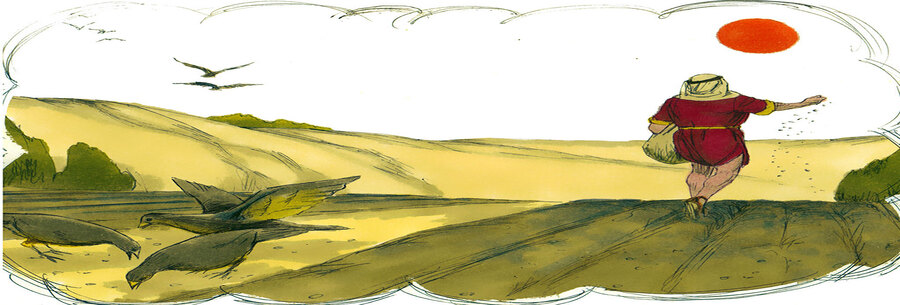The Parable of the Sower, found in the Gospels of Matthew (13:3-9), Mark (4:3-9) and Luke (8:5-8), is one of the most famous parables taught by Jesus. This illustrative story highlights how God's word is received by different kinds of hearts and the results that follow.
< The Sower and the Different Types of Soil:
The parable begins by describing a sower who goes out to sow. As he sows, the seeds fall on four different types of soil. These soils represent the various receptacles of God's teachings in the lives of individuals.
The path represents those who hear the Word, but the devil comes and takes the seed from their hearts, so that they do not believe and are not saved.
The rocky places symbolise those who, when they hear the Word, receive it with joy, but have no deep roots. When persecution or hardship comes, they give up.
Soil among thorns represents those who hear the Word, but the cares of this world, the deceitfulness of wealth and worries choke the Word, making it unfruitful.
Fruitful soil embodies those who hear, understand and accept the Word. They bear fruit, some thirty, some sixty, and some a hundred.
The Profound Teachings of the Parable:
The Parable of the Sower offers profound teachings about receiving God's Word into our lives. It highlights the variety of human responses to spiritual truth, warning against hearts that are hard, shallow or overly preoccupied with the things of the world.
It invites reflection on how we receive God's Word, emphasising the importance of an open heart, deeply rooted, and free from fetters.
It warns against the trappings of the world, symbolised by worries, riches and cares, which can stifle spiritual growth.
It encourages perseverance despite challenges, emphasising that the Word of God can bear fruit even in difficult conditions if it is received with constant faith.
The Call to Introspection and Transformation:
This parable invites everyone to question the disposition of their own heart in the face of the divine Word. It encourages us to look carefully at potential obstacles that might hinder spiritual growth and to seek inner transformation.
It emphasises the importance of cultivating a receptive heart, ready to welcome truth and allow it to take root deeply in our lives.
It encourages us to be aware of distractions and worldly concerns that might hinder spiritual growth and to work actively to overcome them.
It offers a vision of hope by showing that, however difficult the path may be, God's Word can bear abundant fruit in our lives if we are willing to receive and persevere.
In conclusion, the Parable of the Sower remains a deeply significant source of spiritual teaching. It challenges believers to reflect on the receptivity of their own hearts to the Word of God and to work towards an inner transformation that will allow that Word to bear fruit in their daily lives.















